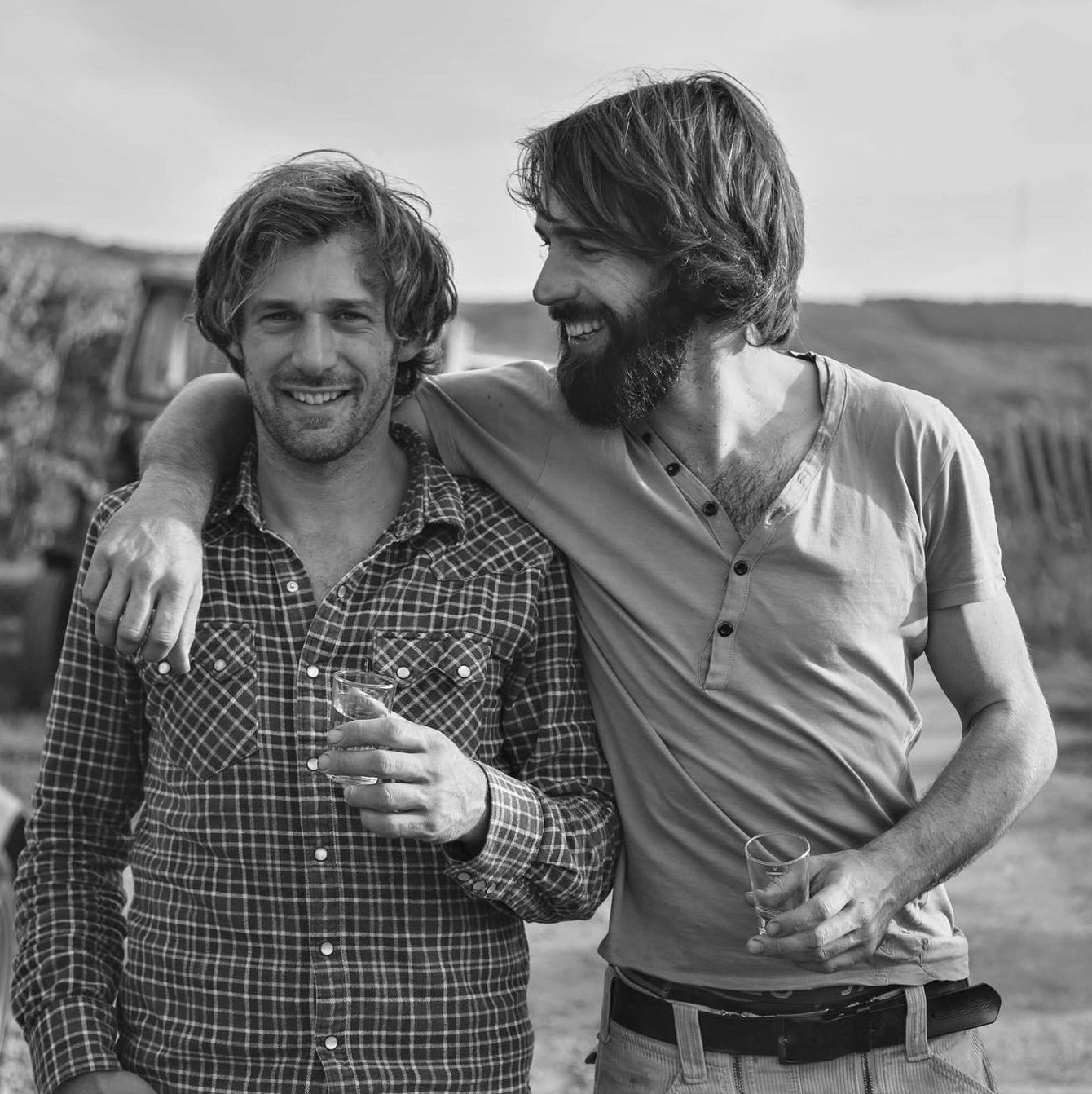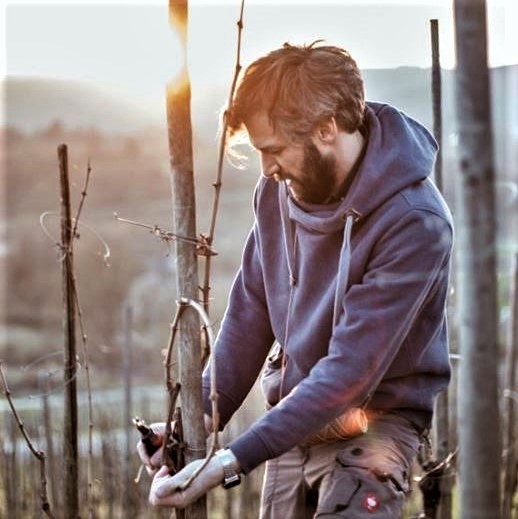Grower: WEBER BRÜDER
Date of interview: April 26th, 2022
Reading time: 4 minutes
Our mission remains simple: to partner with growers who are steadfast in their approach to crafting true wine of the land and of the vintage.
Below is a recent interview that we had with Michi Weber of Saar Valley's Weber Brüder. Michi and his brother Stephan are among the next generation of EU growers reclaiming family land and dedicating themselves to no-compromise wines of place. Their home of Wiltingen features a large concentration of the Saar’s most historic vineyards, some of which they are fortunate to have land holdings in.
Since founding their weingut in 2013, the brothers have quickly built an international reputation worthy of regular coverage in Mosel Fine Wines, among other notable milestones.
Focusing on sweet wines with a few dry expressions, these are clear cut and dazzling expressions, simmering with the complexity that is only achieved with spontaneous fermentation. We're proud to have introduced these wines to the country - our sense is that it's only a matter of time before Weber Brüder is invited to become a VDP grower.
In this interview, Michi talks family legacy, changing wine styles, and forgetting his technical background to make true Saarwein.
Vine Farmer: Can you tell us about your family’s landholdings and how you and your brother founded this relatively new weingut?
Michi: Our family has a long history in viticulture, but we don’t know exactly when everything started. What we do know is that the house of our grandmother was built in the 1740’s. At that time, it was traditionally known that each local family was working one and a half to two hectares of vines and had a few cows, a horse, and some chickens.
When my uncle renovated the house, he found a book of the winery from my great, great grandfather, which referenced taxes for wine from Napoleon. So, at least it is going back to this time that they bottled the wine and sold the wine. My grandfather started producing and bottling wine from about one and a half hectares of land, but eventually only grew grapes for cooperatives.
When he passed away, we all worked for my grandmother in the vineyards so that she got her grapes and could sell them. And then when she passed away, the land got split, so every part of the family got a little piece of land.
When split up, the land is too small for selling grapes - it's too much work for not much to sell. And there was a lot of emotion in the land because the vineyard that we got was planted in the 1960’s (Wiltinger Klosterberg). When they planted the vineyard, my father was just five or six years old or something like that. Always, when he came home from school, he had to go into the field to make holes for the new plantings. My Brother and I didn’t feel that we could stop this - it’s our tradition, it’s our history.
But, the exciting thing is that in 1963 this vineyard had its first harvest, but it all went to the cooperative. In 2013, when Stephan and I decided to make our own little company, it was the first time the family was taking the grapes home from that vineyard.
Vine Farmer: What did you and your brother do before founding the winery in 2013?
Michi: For me, when I finished school, I was always thinking about studying viticulture. At one point in my life, I was an adult, and I had to choose between viticulture or social work - I was working with disabled people on a biodynamic farm and it was a really great experience, and I was struggling with whether I should go into viticulture or more social work.
I ultimately entered into viticulture internships and became pretty sure it was right for me. I eventually decided to go to Geisenheim University for viticulture (a famous program) from 2004 – 2008.
There, I did internships, and was in Portugal for six months in 2007. That was quite a big thing for me, leaving Germany and working somewhere else. It was a good experience, and I ended up making the white wine for a Portuguese family for 4 years. I was living with the family – it was really amazing - and I had a lot of friends in Lisbon. When I finished work there, I jetted to the southern hemisphere to Australia.
After these experiences, I was kind of not ready to go home, especially since there was no winery waiting for me. So, I decided to go to France to start an international degree. I got a Master’s in Viticulture with twenty-one students from seventeen different nations - quite a good mix.
After finished my masters, I went to America and worked for Gallo winery in Modesto for a couple months, and then I was ready to go home. Working for Gallo, I began to remember spontaneous fermentation, acid driven wines, and terroir expression – the feel of going back to the old world. And so, I came home Christmas 2012, and just then Stephan and I started talking about our own winery.
Stephan had a different path. He studied architecture, but after one year, he realized it wasn’t right. So, he followed me to Geisenheim, but he was studying marketing. When he finished, he worked in Austria and did some internships and then got a good job in Luxembourg. He is now also the winemaker and cellar manager for a well-regarded estate there.
We are not coming from a wine family in the sense that there was no winery and no estate bottling. So, we took the grapes home from this old parcel in 2013, and we never expected that we would have such a start. We just wanted to do the wine for ourselves and for our families - just producing two thousand liters. But then friends and family bought our wine, and it grew from family and friends, to regional, national, international.
Vine Farmer: You made a prior comment about getting back to old world techniques after your time at Gallo. Did you learn to make wine in an old-world way abroad, or were you making wine in a more technical way?
Michi: Where I worked in the new world and off in Portugal, we would do, not technical wine - but yeah, it was selected yeast and there was more machinery. We wanted our philosophy here to pair the traditional, old-world methods with the knowledge of today. So, basically, we do the same kind of wine as one hundred years ago, but we know more about it. Our goal is to keep everything in nature’s hands. We are not manipulating our acidity, we are not fining, we are not using cultured yeasts. We avoid pumping and work with gravity. Basically, like it was one hundred years ago.
Vine Farmer: It sounds like your time abroad served as a contrast, helping you know how you wanted to make wine when you came home. Is that accurate?
Michi: Totally. It helped to define our goal on how our wine should be. Particularly, we understood how unique our region is. We can taste our wines and can tell you where they’re from.
Vine Farmer: What is important about the work you are doing?
Michi: The respect of nature and our soil and terroir. What we think about is not just using it now. Stephan and I have kids. We don’t know, they could be interested in taking over and working with wine as well. We keep these decisions free. But, at least if someone wants to work with the land, it should be a healthy thing - healthy soil, healthy vineyard, and a healthy winery.
Vine Farmer: What goals do you and Stephan have? What do you hope your reputation is when people talk about the wine that you make, in five or ten years?
Michi: I think the best compliment is always when we hear that we have real Saarwein; speaking for the region and for the "single slopes”. My Grandfather could taste and could always accurately tell where the wine was coming from, which hill. How cool is that, that we can feel the character of a particular wine across different vintages?
Vine Farmer: What is true Saarwein?
Michi: For me, a true Saarwein wine has spontaneous fermentation, so it has different layers of taste – it’s deep and with minerality. The backbone of a Saarwein is the acidity. Then, it’s about the balance between acidity and sugar - that’s what we love. Even with climate change, we still have low alcohol wines. They’re refreshing. You can pair Saarwein to so many different foods or just drink them on their own.
Vine Farmer: With regards to sweet versus dry, has style changed over time?
Michi: We are the coldest German wine region. This means higher acidity – to make the wine enjoyable, we must balance acidity with sweetness. Traditional wine was in a sweeter style; a Kabinett weight. In recent years, dry wine has been coming out really good because it’s been getting warmer and people have more experience with dry wines and reducing yields. It’s changing for sure.
Vine Farmer: What is your general farming philosophy?
Michi: When we took over the vineyards in 2013, we decided right away to stay away from herbicides. We worked in different ways to control the weeds starting with manual hand work. We then used a till, but it was too much. Then we bought sheep to work the land. We knew we needed a different way, so today we plow our rows. The point is that all our efforts were to work without chemicals. In 2016 we converted to working in a completely ecological way, working only with copper and sulfur in minimal doses. We are not focusing on any certifications although we could have them.
Vine Farmer: What is your harvest philosophy?
Michi: It depends on the year. If everything stays healthy and we have good acidity and sugars, then we pick everything for a plot at once. We are picking when we know we are a good point where ripeness, potential alcohol, and acid are in balance. We taste every day to decide what we are picking next. We do a pre-harvest and pick out what is damaged, in several passes.
Vine Farmer: Do you have a favorite site?
Michi: Oh yes, the Wiltinger Klosterberg is our highlight because that is where we are coming from. That’s the slope where our family was working for ages and the vines are very old. We also bought some really good land in Wiltinger Braunfels and really good sites on red slate and grey slate. Every vineyard is separate, and you know the taste and you love the taste, and so, every vineyard is like one of your kids.
Vine Farmer: Anything else to note about the cellar philosophy not already stated?
Michi: The cellar work is just crushing, pressing, racking…and everything is done by indigenous yeast.



